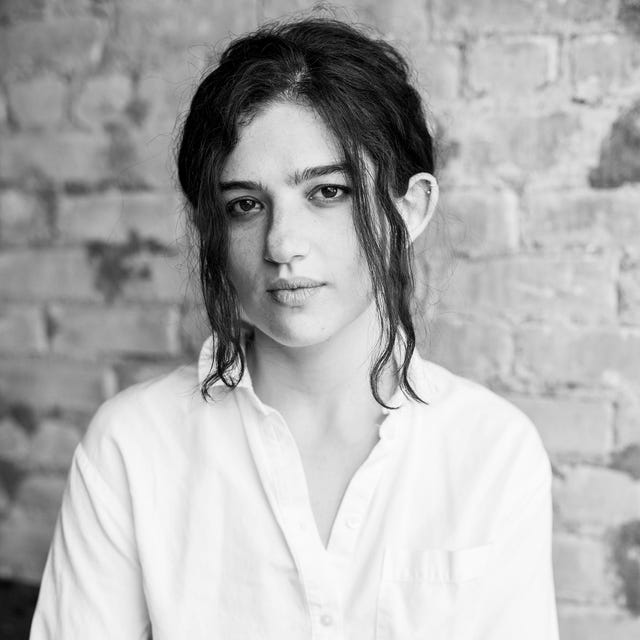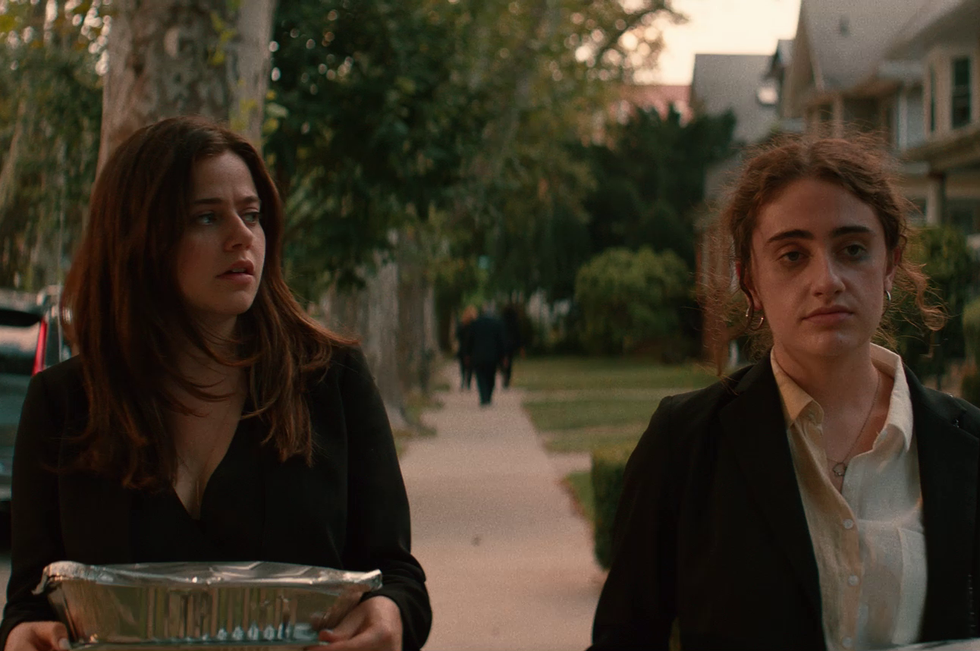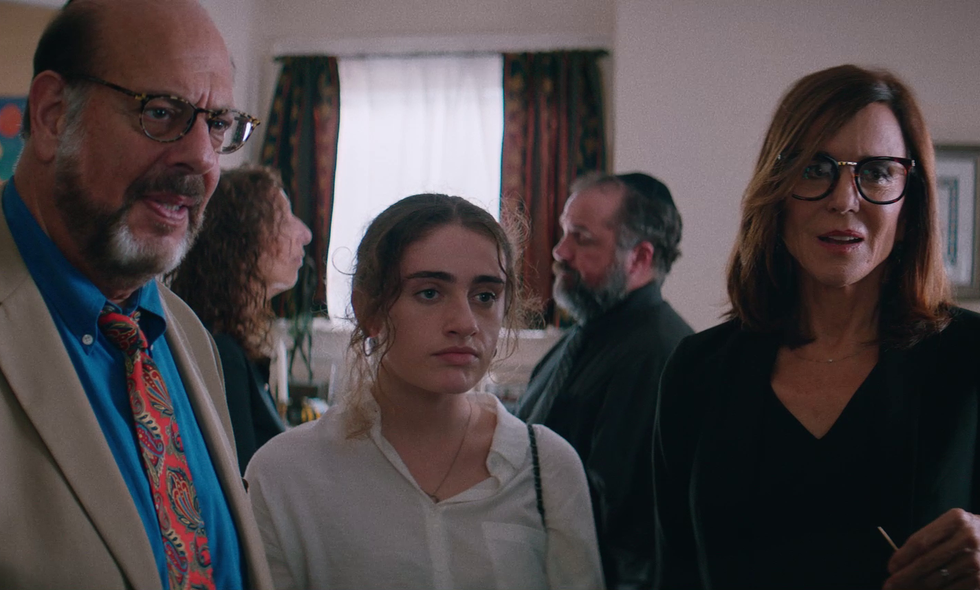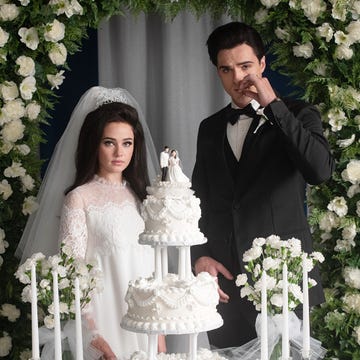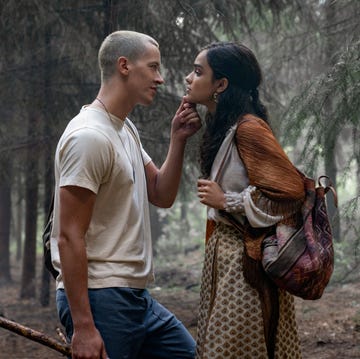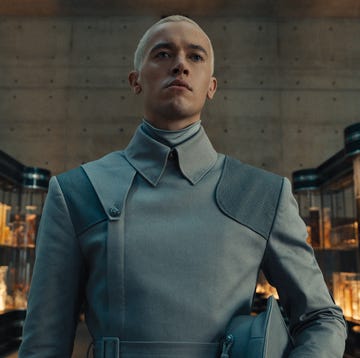“I feel like I just had a therapy session,” Emma Seligman says at the end of our conversation—a loaded remark made from one queer Jewish woman to another. “A wonderful one! A wonderful therapy session,” she clarifies.
Seligman is the 26-year-old director of the runaway festival hit Shiva Baby, which premiered at last year’s SXSW to widespread acclaim. Debuting on VOD and in theaters this Friday, the film stars Rachel Sennott as college almost-grad Danielle, who must endure an afternoon at a shiva whose guests include her ex-girlfriend, her sugar daddy, said sugar daddy’s wife and infant daughter, and every single middle-aged Jew in Brooklyn. Adapted from Seligman’s short film of the same name, the movie is a masterclass in discomfort, with the viewer watching Dani’s nervous breakdown unfold almost in real time as her parents’ friends pummel her with questions about her career and romantic prospects.
If all that’s not enough to sell you on the idea of Shiva Baby being The Film of the Season, consider the fact that most of us are now intimately acquainted with the feeling of being trapped in a house for an extended period of time with life seemingly falling apart around us.
Despite the grim mood of the film and also the world at large, Seligman—who’s talking to me from Los Angeles, where she moved a week ago—is in relatively good spirits. “I’m so excited to be here,” she says, “even though people here are like, ‘This is L.A. when it’s cold and cloudy.’” Seligman’s current career prospects, on the other hand, are sunny: She has producers across the film industry clamoring for a new project, her favorite directors are lining up to meet her (she just met Joey Soloway over Zoom), and all the acquaintances who once doubted her are fighting for the opportunity to blow smoke up her ass—if she’s willing to let them, that is.
Over the course of a sunny-chilly Los Angeles afternoon, Seligman opens up about her experience collecting cinematic influences, searching for encouragement as a queer female filmmaker, and shepherding Shiva Baby to completion.
You went to school at NYU Tisch. Is that how you met Molly [Gordon] and Rachel [Sennott] and most of your collaborators?
Rachel went to NYU and was in a lot of my friends' short films, but I'd never met her until I asked her to audition for the short film. Molly, we just offered the role to, because we'd seen her in Booksmart and just thought she was so funny, and she's Jewish. Otherwise, pretty much everyone on set was NYU, even if they were a few years older and I didn't know them until later.
I’m interested in the fact that you clearly went to college knowing you wanted to make movies. You got to figure out your voice and your vision early on, which a lot of artists don’t get to do until they’re a lot older. What was that like?
I always knew I wanted to be in the world of film, but as a kid, I wanted to be a film critic. Both my parents are film buffs, and they love movies so much. I grew up in Toronto, so I got to go to TIFF a lot—it's government funded, so it has all these kids' programs and teens' programs. I was a juror for their kids' film festival, and they had this high school committee where they got teens to host events and have our own little mini festival.
I had film kind of everywhere around me, even though my parents don't work in the industry. I was just a little film nerd. I loved watching At the Movies with Ebert and Roeper, and I loved watching Turner Classics. Kudos to my public high school that didn't have an arts program, because we were learning about the Actors Studio theory and Elia Kazan, and then I became obsessed with Elia Kazan and how he went from theater to film.
And once I got [to film school], I always knew I wanted to do something Jewish first, because that's just the easiest thing for me to write. I had such a big extended family, and I saw them all the time, so I felt like I understood them more than I understood my friends. Like, middle-aged Jews were me.
That makes sense, because there’s a really strong Transparent influence in Shiva Baby.
Once I saw Transparent, I was just so floored. I'd never seen Jews portrayed in such a grounded and modern fashion—you know, reform, religious-ish Jews. I related to them so hard, and I don't think I would have been able to make Shiva Baby without Transparent.
I heard Joey Soloway saying in an interview once that when they were in writers' rooms for forever, they kept working on feature screenplays, and they would show it to their male contemporaries or their mentors, and those men would be like, "No. … Put this away. Don't be that ambitious," or whatever it was. And Joey would go, "Oh, okay," and put it away. I guess once they got to Transparent, they were just like, "Fuck it, I'm so sick of hearing people talk like that."
I think that raises a really interesting question of who gets discouraged and who gets encouraged without even looking for that encouragement. Even at Tisch, I’m sure there were differences between who was encouraged to direct versus who was encouraged to maybe move into less central production roles.
Definitely. When I said to friends—even female friends—"I'm going to make a feature out of my thesis," everyone was like, "Okay … sure." It kind of sucks. I think if I was a dude and was like, "I'm gonna make a feature," … I have no idea if it would have been different. But I just stopped talking about it after that. I was like, "Okay, it seems like I really piss people off when I say that I want to make a feature." And these were some of my friends too.
Different people are encouraged in different ways, and I think female ambition is always sort of like, "Okay, relax." I feel like I had to keep my ambition to myself or something, I don't know. I always think if you aim really high, you're going to fall in the middle.
Tell me about the journey of going from the short to the feature. What was the process like, especially in light of the fact that you felt you couldn’t talk about it to anyone?
It's interesting, I never thought about it in this context, but Rachel was one of the first people that didn't give me a shitty response when I was like, "I'm going to make this feature." Now I look back and it's like, "Oh, of course I started making the feature when I did," because she's one of the most ambitious people I know and she has no shame. I don't think she's ever felt, "Well, I shouldn't be ambitious because I'm a woman," or whatever it is.
At the time I met her she was doing two open mics a night. I didn't even think about it at the time, but that's how the process started, because she was like, "Well, what are your weekly, monthly goals to make this happen?" It started with having myself be held accountable by her. What sucked was going to half of the indie New York production companies, and everyone just said no. Then our producer was like, "No, you just get a million people who've never invested in film before and just convince them." And being Canadian and a woman, I was like, "What? I'm not gonna ask my family, friends for money!" But that's what we started doing.
Other people have commented on the fact that the film feels a lot like a horror film. I know you’ve said that was intentional with the score, less so with the cinematography. What made you decide to lean in to that feeling?
It really just came out of practicality, because I was like, "Who's going to be interested in being [in] this house for a day?" One piece of good advice that we did get from a production company is, "This seems like a coming-of-age story in a day, so what needs to happen in this day? Why is her life completely transformed after this day?" I was like, "What films have been successful that take place in one to three days in one location?" And I just started watching those, and a lot of them were very anxiety inducing. None of those films were horror films, but as time went on, I was like, "Oh, okay, I can see how those mechanisms are the same."
I started with Krisha, honestly, and then I read that [the director] was inspired by Cassavetes, and I read Opening Night had a shiva scene, and I was like, "I wonder how Cassavetes would shoot a shiva"—I didn't end up using that scene at all, but I used some of the claustrophobic lobby scenes outside the theater. I was just starting to think about things in my movie brain that were coming out, and they were all anxiety ones, or just cringe, like Rachel Getting Married. And so that informed the cinematography, because my DP and I developed this shorthand where I was like, "Oh, this will be an Opening Night shot," or, "This will be Black Swan," or, "This will be The Graduate." It just sort of came to be from that. I wanted it to be anxious, that's the word I kept using, and then I leaned in to it with the score, like, "Oh, of course, horror movies are anxious."
You may be too busy with the release to be thinking much about your next film, but what are you excited to do that you didn’t get to do with Shiva Baby?
I'm so grateful that this movie exists. I would not change a thing for the world. I don't regret anything about it—but it was hard to pull from this time in my life when I had no self-worth. I did have a nervous breakdown, as many people do, but I don't think I ever moved past it, 'cause I was like, "I'm going to make the feature, I'm going to make the feature," so I stayed in that headspace.
All this is to say that I feel like I'm actually more interested in other people's material and lending my perspective to something that I didn't go through, personally, and that could mean so many things. Once I got to the end [of making Shiva Baby] and people were like, "Well, it's kind of a horror movie," I was so flattered, because I feel like film and TV by female directors is always in this dramedy. I think about Nicole Holofcener or Tamara Jenkins or Nora Ephron or Gillian Robespierre or Desiree Akhavan, and they all live in this sort of realistic dramedy space. I'm really proud of Shiva, but at the same time, I never thought about doing any other genres, because I didn't see female directors doing Westerns or whatever.
There’s definitely this message out there that female directors tell stories about themselves.
Exactly! And there's nothing wrong with people asking, "Was this inspired by something? Did it come from you?" but I never hear that being asked from male directors in the same way. I've had experiences over the course of the last year where it feels like it's almost someone's right to know what I went through to make this movie, like, if I sugared and how and when. I don't want to say the only reason I'm having success is because I'm the same age-ish as the character and because it's so clear that it's inspired by me, but I would really like to be able to do stuff like Karyn Kusama or Ana Lily Amirpour.
One thing we haven’t talked about yet is that Shiva is so queer. Is that something that you automatically gravitate toward or something that you make an intentional choice to include?
I want to make every movie I do going forward with a queer female lead, if it's my original idea. I just feel like there's so many queer people that are film buffs—like, there's tons of queer women who love The Fast and the Furious. Wouldn't it be so cool to just have a bunch of, like, gay women and bisexual women driving fast cars? You know what I'm saying?
I'm so glad that, I think, the world is opening up slightly more for female directors in terms of opportunity, but I feel like there's so much more room to flip genres on their head and take the tropes of a male lead and make them queer, so I'm just like, "Why not?" Especially because it's something that I feel is important to me and my identity. I still feel as a bisexual person that I'm still ever so slightly cracking away at the part of me that's like, "Well, I'll end up with a man." It's like, "Well, why is that? Why do I think that?"
Bisexual representation is especially hard to come by. Either everyone’s a Kinsey 6 or someone’s written as straight and then given a same-sex love interest almost as an afterthought, whereas in real life, there are so many different ways to be bi.
Yeah, if it's a female character that's bi, it feels like sometimes it's just, like, sprinkled into her life as, like, “spiciness,” you know what I mean? And then, on the flip side, if it's a male bisexual lead, it's just packaged as a gay love story.
I don’t even think I can think of a male bisexual lead.
Call Me by Your Name
Oh, really? Yeah, I guess so.
Yeah! I think he liked that girl a lot, he just fell in love with Armie Hammer['s character]. In the book, it's clear that he's bi.
See, and I had that feeling about Ryan, the gay crush from Booksmart. You never actually see her get with a girl, but she’s flirting with Amy the entire movie!
Yeah. I mean, unless it's explicitly like, "Oh, this girl's a queer baiter, she was purposely trying to just lead her on for attention," then, yeah, she just likes both genders. I think people's brains are so small sometimes, like there's no concept of fluidity. I think my first viewing experience of bi characters was Olivia Wilde and Mischa Barton on The O.C. I feel like so much of the time, when there are two female love interests, people are like, "But it's subtle, you know, we don't even have to show it," and you're like, "Well, why can't they make out? How many times do I have to see an unsubtle straight sex scene," you know?
I sort of struggled to do that with Shiva, because I was like, "How much can I get away with? They can't have sex at a shiva." I knew that ending shot will be the hand-holding, and I was like, "No way is that going to be their only form of physical affection." So then, I gave them the makeout. I almost feel—not naive—but I feel like every movie I make is going to have a queer female lead. And it's like, "Well, that might be an uphill battle," because I got to make Shiva on my own, I got to raise the money on my own, and maybe it's not always this way. I don't know if I'm prepared for what I'm going to face in terms of obstacles.
On the other hand, I feel like you can almost sort of weaponize your naivety, like, “I don’t know that it doesn’t usually work this way, so I’ve just decided that this is the way it’s going to be.” Men do that all the time.
I never thought about it that way, that that can be weaponized. I feel like that's how I felt with regards to the ambition thing, about making Shiva, like, "Well, why wouldn't I make it?" I feel that way about Rachel all the time. She's like, "Well, why couldn't we make this? Why couldn't we sell this? Why couldn't we get multiple studios bidding on whatever this is?" And I'm so surprised, because each step of the way, I'm so excited, and then she's like, "Okay, let's go further."
This interview has been edited and condensed for clarity.

Keely Weiss is a writer and filmmaker. She has lived in Los Angeles, New York, and Virginia and has a cat named after Perry Mason.
